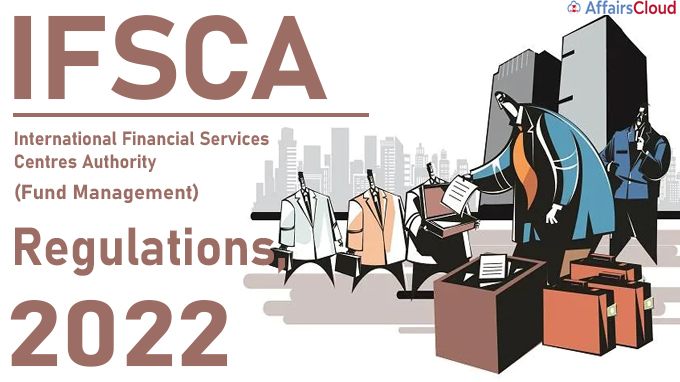
The International Financial Services Centres Authority (IFSCA), has notified ‘International Financial Services Centres Authority (Fund Management) Regulations, 2022’, a comprehensive regulatory framework for Investment Funds in the official gazette on April 19, 2022.
The IFSCA has proposed enabling retail closed-ended schemes to invest in unlisted securities, subject to certain conditions, in response to the growing need to make it easier for large investors to participate in private markets.
Key features of the regulations:
i.Registering the Fund Management Entity: A Fund Management Entity will be registered with IFSCA and will be allowed to manage various types of funds and schemes if they match the eligibility criteria.
ii.Green Channel:Venture Capital Schemes or non-retail schemes that solicit money only from authorised investors qualify for the green channel.
- It implies that after filing with the IFSCA, investors will be able to subscribe to the schemes that have been registered.
- The rules establish the size of the scheme, the number of investors, and the types of investments that are permitted.
iii. Exchange Traded Funds (ETFs): As ETFs offer a low-cost option to get exposure to specific markets or asset classes, registered fund managers in the IFSC will be permitted to create not only index-based ETFs, but also Active ETFs and Commodity-based ETFs.
iv.Stressed Assets: A framework for special situation funds to be created by fund managers in the IFSC has been established, highlighting the importance of the IFSC in the government’s initiative to address the problem of Non-Performing Assets (NPAs) in banks.
v.Environment Social Governance (ESG): A rising number of investors demand fund managers to include environmental, social, and governance (ESG) factors in their investment strategies.
- Disclosures at the entity and scheme level have been proposed to be mandated with the intention of making the IFSC a hub for a range of activities connected to sustainable finance.
vi.Family Office: A formal structure for managing and safeguarding the wealth of high-net-worth individuals (HNIs) and ultra-HNIs, as well as their families, is becoming increasingly important around the world.
- As a result, the regulations have a framework in place to make it easier for a family office to run its own investment fund.
vii. The regulations also provide controlled assistance for a number of innovations:
- Fund Lab: This allows fund managers to test new strategies in a controlled environment and develop a track record for their fund.
- Special purpose vehicle (SPV) as a co-investment structure and leverage: FME may establish special purpose vehicles (SPVs) under the main scheme to enable co-investment or leveraging with the Fund or scheme, subject to specific requirements.
- Retail participation in private markets: There has been an increasing demand to make it easier for retail investors to invest in private markets.
- As a result, it is suggested to make it easier for retail close-end schemes to invest in unlisted securities, subject to specific requirements.
In addition to the abovementioned, the regulations define the roles of various organisations, establish a code of conduct, an advertisement code, investment valuation criteria, and essential governance requirements, such as the substance requirement.
About International Financial Services Centres Authority (IFSCA):
It is a unified authority for the development and regulation of financial products, financial services and financial institutions in the International Financial Services Centre (IFSC) in India.
- It is established under the International Financial Services Centres Authority Act, 2019.
Chairperson – Injeti Srinivas (First Chairperson of IFSCA)
Establishment – April 27, 2020
Headquarters – GIFT City, Gandhinagar in Gujarat.




